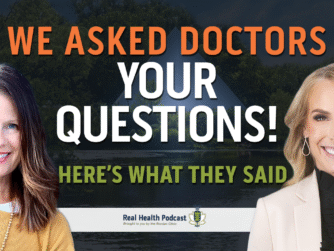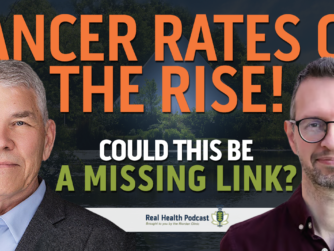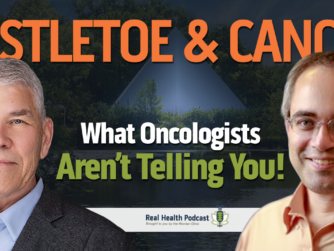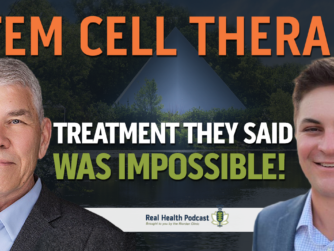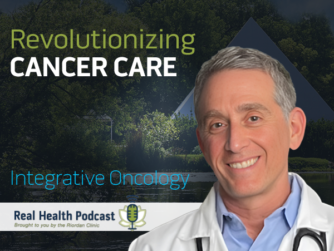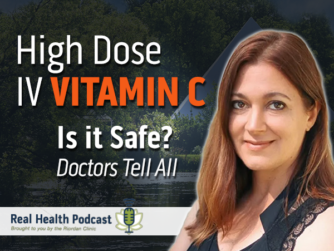In this episode of the Real Health Podcast, Chief Medical Officer Dr. Ron Hunninghake, MD, and Dr. Doug Thompson, D.D.S., FAAM, ABAAHP, discuss how dental microbiome can impact your health, including inflammation, cardiovascular, and cognitive health. How can you help yourself? You can make sure your mouth is as clean as it can be.
Watch the video
Thanks to this Episode’s Sponsor
Bio-Center Laboratory: https://biocenterlab.org/
Links
Learn more about the host:
Dr. Ron Hunninghake, MD
https://riordanclinic.org/staff/ron-hunninghake-md/
Learn more about this episode’s guest:
Dr. Doug Thompson, DDS, FAAM, ABAAHP
https://wellnessdentistrynetwork.com/
Contact@WellnessDentistryNetwork.com
Read the Transcript
Disclaimer: The information contained on the Real Health Podcast and the resources mentioned are for educational purposes only. They’re not intended as and shall not be understood or construed as medical or health advice. The information contained on this podcast is not a substitute for medical or health advice from a professional who is aware of the facts and circumstances of your individual situation. Information provided by hosts and guests on the Real Health Podcast or the use of any products or services mentioned does not create a practitioner patient relationship between you and any persons affiliated with this podcast.
Intro: This is the Real Health Podcast brought to you by Riordan Clinic. Our mission is to bring you the latest information and top experts in functional and integrative medicine to help you make informed decisions on your path to real health.
Dr. Ron Hunninghake: So welcome, everyone. I’m Dr. Ron Hunninghake, and I’m really thrilled today to have Dr. Doug Thompson, who is a very special dentist. He’s up at the University of Michigan. Oh, he graduated from the University of Michigan School of Dentistry. And maybe Doug, you can kind of tell our audience where you’re at now and then let me ask the prime question. What’s different about your dentistry than what people typically think about dentists?
Dr. Doug Thompson: Yeah, thanks Ron for the introduction. I graduated from the University of Michigan, but prior to that, I was a 12 year crown and bridge. I worked in a dental laboratory in a dental office, which is quite a different experience. I had some patient interaction and I worked for a very fine restorative dentist at the time, and then went to University of Michigan and graduated in 1996. And I did a one-year residency at a hospital, a VA hospital. And it was there that I started to really see a lot of sick people, and I started to see a lot of dental disease, and I knew there was some kind of significant correlation. And then I bought my private practice in 1997, a year later, and I’ve been practicing there ever since. And the sophistication and the awareness of what’s happened with what happens with oral conditions and systemic health caused me in 2009 to rebrand my practice. And the name of my dental practice in Bloomfield Hills, Michigan, is called Integrative Oral Medicine.
Dr. Doug Thompson: And the reason why it’s impossible not to integrate the mouth with the rest of the body when there’s a health problem. And I might’ve talked to you, we had a small brief conversation before we went on the air, and you may recall that there’s now 57 different systemic diseases that are related to oral conditions or oral pathogenic load like bacteria load. So what makes us very different is we have an awareness about those issues, and very often we employ state-of-the-art, either bacterial testing, which is not terribly expensive and easy to do and painless, and we learn about the makeup of the microbiome in the mouth. And then if it’s disease producing or dangerous, then we have strategies to stabilize that.
Dr. Ron Hunninghake: Most people would not think that the quality of their heart and vascular system has that much to do with dentistry. But yet through this emerging and growing functional understanding of the microbiome of the mouth, what we were talking about earlier is that has tremendous implications in terms of a person’s risk of having a heart attack or even other types of vascular damage, possibly even related to hypertension and things such as this. Can you tell our audience a little bit more about that connection and why it’s important for them to know a little bit more about their dental microbiome?
Dr. Doug Thompson: Yeah, it’s a great question. And our circulatory system that carries blood and oxygen and nutrients to all the cells of our body. I mean, we have 60,000 miles of freeway and the mouth is the entrance ramp. The mouth is an entrance ramp where the bacteria can get in that pathway. And when they get on that pathway, they can go anywhere from your toe to your brain. And these bacteria have certain components as part of their cell wall or part of their makeup that causes our body to react in a negative way. And it changes the biology or it changes the function of what’s going on in the vessel. And it can be responsible for plaque buildup in the arteries. It can have a significant effect on arterial stiffening, which would drive up blood pressure. You mentioned hypertension, and we have a certain couple bacteria that have been identified as being contributors to that arterial stiffness, cognitive decline.
Dr. Doug Thompson: Dr. Ron, I’m so sad that 50 percent of us are going to end up with some cognitive issue, and the other 50 percent of us are going to be dealing with somebody with a cognitive issue. Nobody’s surviving that disease. I mean, we’re all going to have something to do with it. So in dentistry today, we know by learning the makeup of the microbiome in somebody’s mouth, we could either prevent or delay the onset of that for years depending upon how early we can get to the patient. How can you help yourself? You can make sure that your mouth is as clean as it can be, but finding out this other information is important.
Dr. Ron Hunninghake: Do you think … I’ll oftentimes see people with elevated C-reactive protein, which is an inflammation marker, and because I’ve become more aware in recent decades of the relationship of the mouth to overall health, I start thinking about that. I mean, have you found that to be, if people have a CRP that’s elevated and they don’t have any specific joint problems or any other explanation for that, would you be looking deeper into their mouth issues, the microbiome of the mouth and whatnot?
Dr. Doug Thompson: Yeah, it’s the number one thing. It’s one of the number one things we look for, and it gives me objective data to know that something in the mouth could be causing a problem. And what that is, Ron, is I actually order some cardiovascular biomarker metrics on patients with disease so I can determine if certain things like that are elevated. And the panel that we order is broken down into inflammatory components of blood disease, that’s inflammation of heart disease and vessel health. And we look a little bit at lipids. We don’t treat lipids here. This is where we have a beautiful collaborative opportunity to work with physicians like you where we can send somebody over, you could send someone to me and say, Hey, this patient has elevated HSCRP, I can’t really figure out why. Can you help me? I find oral infections most of the time on those patients, and I get referrals for elevated myeloperoxidase, elevated Lp-PLA2 from physicians. I’m in Bloomfield Hills, Michigan. I had one physician in Massachusetts refer me a patient from Belgium. So I had a patient fly from Belgium, spend a half a day in my office so we could do a thorough workup and that patient’s being treated from a distance. So there’s no question that yes, there’s objective biomarkers, and we see direct evidence that when you stabilize the dental infection, the cardiovascular biomarkers get better.
Dr. Ron Hunninghake: How much do you think the person’s diet, I mean, this is a stupid question because we know diet makes a big difference, but aside, and people know that sugar is a big issue. What other dietary factors do you find promotes imbalances in the biofilm?
Dr. Doug Thompson: Well, this is a whole can of worms. I mean, we could talk for days on nutrition and dietary eating styles or nutrition styles, but even people that go on some of these really super high protein diets where they’re just eating all protein and fat, they’ll have increased inflammation in the mouth. The best diet for oral care is going to be a diet rich in antioxidants, green, leafy vegetables, a little bit of meat if it’s clean, fish, poultry, or beef, or even pork if you eat that type of food. But it should be clean, nothing more than a deck of cards. That whole Mediterranean-style diet is going to be great. And we have good studies to show that following dietary guidelines and eating a healthy diet is going to yield less bleeding. It’s going to yield a better overall collagen development around the teeth, and it’s going to be healthier for the patient.
Dr. Doug Thompson: Now, I would just mention, and you could probably educate me more about this, but even types of fasting, whether it’s caloric restriction based on a certain number of hours, we call that time-restricted feeding or fasting mimicking or some sort of fasting that also has profound effects on resetting the metabolic state of the patient. If it’s done under a physician’s guidance and with care, you can get some big benefits from that as well. So when we see a patient, we like to ask them about their diet, we like to do maybe a micronutrient panel or get an idea if they’re deficient in anything. And then we’re just trying to educate the patient on the best eating style. And many of us, it’s moderation. Dr. Ron, I like pizza, I like some of that stuff, but you just can’t have a steady diet of some of the things that are inflammatory.
Dr. Ron Hunninghake: Getting back to one of the basic things, brushing your teeth regularly, flossing your teeth, and the types of toothpaste that a person should use, is charcoal toothpaste a good one to use, for instance? Can you talk a little bit about that? Because I know people want to take good care of their mouths, but they don’t know about some of this new information that you’re speaking of.
Dr. Doug Thompson: Yeah. Toothpaste is interesting because the most important thing about toothpaste in the past has been they’ve put chemicals in the toothpaste to either harden the teeth, which would be a fluoride-type additive.
Dr. Doug Thompson: Now the new one is nano-hydroxyapatite, but there’s certain additives to the toothpaste to allow you to help harden the teeth. Or maybe they change the type of fluoride from sodium fluoride to stannous fluoride, which maybe has a little bit more antimicrobial property, or maybe they take the fluoride out totally and you’ll have a paste that’ll have a botanical product that has an anti-microbial suppressant if you will. But there’s no paste right now that is a magic bullet for gum disease or for a significant oral issue. The pastes are really simply adjunctive. And if the paste works for you and it tastes good and you enjoy brushing with that paste, that’s probably the biggest benefit. And in fact, you don’t even need toothpaste to brush your teeth. Toothpaste just carries the additive to the teeth. So we do a risk assessment on every patient. And if you’re high risk for dental cavities, then I want you to use a paste that has things in it that helps harden the teeth, and that would help resist the cavity causing bacteria. If you were very low risk for dental cavities, I would say, Dr. Ron, go wild. Get whatever you want. It doesn’t matter because at that point, you’re just going to enjoy brushing your teeth.
Dr. Ron Hunninghake: What about the tongue? There are tongue scrapers, there are tongue brushes and that there’s such deep furrows in the tongue. I’m sure there’s a lot to be said about the microbiome there, but what kind of recommendations do you have your patients follow in terms of taking better care of their tongues?
Dr. Doug Thompson: Yes, tongue brushing, tongue scraping, and tongue cleaning is important. And I just learned something from you. You used a nice word. You talked about furrows, and I think it helps people understand these hills and valleys that live or that are part of the anatomy of the tongue. And some of those are very deep, and they’re actually deep, just like the pocket or the crevice between the tooth and gum where you stick a toothpick and you try to pull out a popcorn hole, and bacteria do live down there. So scraping the tongue and disinfecting the tongue is going to be important. And one of the things I want to be careful with is using the word like disinfecting the mouth or how we clean the mouth because there’s no such thing as disinfecting the mouth. And I want to make sure that anybody with a healthy mouth, there’s no reason for them to use any kind of medicinal rinses or any kind of mouth washes. We only reserve the use of mouthwash for people that have what we call a dysbiosis, and we’re trying to correct it. Once it’s corrected, then we don’t want people using harsh chemicals in the mouth that alter a microbiome if it’s healthy. That’s the idea. So in our practice, we want to get the microbiome healthy. We can measure that, and then we want the patient to use as little as possible to keep it healthy.
Advertisement: There’s a lot more to this conversation, and it’s coming up right after a quick break. Today’s episode of the Real Health Podcast is brought to you by the Riordan Clinic Nutrient Store. The Nutrient store is your resource for the highest quality nutritional supplements. Every supplement in the store is handpicked by the expert medical staff at Riordan Clinic providing you with the best quality, purity, consistency, and effective dosing available. Visit store.riordanclinic.org to shop.
Dr. Ron Hunninghake: So the dysbiosis, this is I think an incredibly important concept and word for people to understand that there is a whole system of different bacteria, yeast, and viruses that are in the mouth just like there is in the gut. The mouth, after all, is the first part of the gut. What are you recommending for people to do to really maintain a healthy biome in their mouth?
Dr. Doug Thompson: Yeah, the biggest thing is going to be right back to where we started, and that’s going to have a very effective way of cleaning in between the teeth.
Dr. Doug Thompson: And what I would say, Dr. Ron is sometimes, if you have some gum recession and you have some space between the teeth as the gum recedes, the teeth get actually quite torturous. There are curved surfaces, there’s little depressions in the roots of the teeth, and sometimes floss isn’t going to be so effective. So for those people, we might recommend little brushes, picks, different things that you can put in there to clean in between the teeth. So you have to have an effective method to clean in between the teeth. And then, we need an effective method to remove the biofilm on the outside of the teeth and on the tongue side of the teeth. Both of those surfaces need to be meticulously clean. And then of course, scrape your tongue, keep your tongue clean, and if you have any kind of either bad breath like halitosis or you have any kind of oral abnormality, you want to get that checked out. So we recommend at least visiting your dentist if you’re perfectly healthy for sure. Once a year, twice a year would be more preferable. And if you’re disease susceptible or you have any kind of gingivitis or gum disease or anything like that, you need to be on a more current regimen maybe four times a year for most people. Three times can suffice for some as well. And we give you feedback when you come in on what the ideal frequency is.
Dr. Ron Hunninghake: Do you agree that the dental hygienist is an important part of the dentist team? Is that important to have the kind of scraping that they do on the teeth, the calculi and stuff?
Dr. Doug Thompson: Yeah, that’s a great question, Ron. And as a matter of fact, I’ll tell you how passionate I am that they’re important. I call, I refer to that team, that care team in my practice, I call them periodontal therapists.
Dr. Dan Thompson: They’re not dental hygienists. They’re doing way more than that. They actually, they can identify disease; they can be very significant in developing the plan to stabilize a disease. And they’re the gatekeepers. They see you when you sit down. A lot of times the dentists come in after the periodontal therapist or dental hygienist has already cleaned their teeth. And so the dentist doesn’t often get a feel for how they presented to the office and what kind of job they are doing. And again, I’m so passionate about that piece. I have developed a two-day hygiene training program at an institute in Seattle called the Kois Center, and I teach dental hygienists how to become periodontal therapists in that course. So it’s a big passion of mine, and this is something you and I did not talk about, but it’s a big passion of mine, and they’re very, very key people in the practice.
Dr. Ron Hunninghake: Very good. What would you say currently is the number one, shall we say, risk that people have with not taking care of their mouth? I mean, obviously people would say, well, cavities, right? But what I understand you to be saying is that this has broadened out quite a bit in terms of your general health, but what would be the number one thing that people should be thinking about in terms of getting this broader type of thinking about dental health? Yeah,
Dr. Doug Thompson: I’m going to use the term gum disease because it’s a basic term. Probably 65 percent of the population has a gum disease issue at some point or another, and as we age, it can get to be worse. So the gum disease, being sure that you don’t have active gum disease is really, really important. The number one destructer of teeth is dental caries, which is what is the disease of the person that causes cavities. And so dental caries is a different group of bacteria, but they too, Ron, there’s a lot of science that supports those bacteria move around the body. And in fact, if you had a heart attack or a stroke and you went and excised the blood clot that lodged in the brain or in the heart, you’ll find oral bacteria in that blood clot. So we know these bacteria travel through the body, and if you have disease in your mouth, you’re going to have other downstream effects from having that disease.
Dr. Doug Thompson: Now, two things we didn’t talk about yet, or I didn’t mention, that’s also screening for sleep apnea. Sleep apnea is another very important thing that we can see sometimes because of the anatomy of the mouth and how the mouth is used. So for sleep apnea, it basically what sets that up is our anatomy, how we’re born, our jaw size, our jaw position, our tooth arrangement, and then whether we have anatomical issues like a tongue tie or we can’t breathe through our nose, different things happen that disrupt our nighttime sleeping and our nighttime breathing. And if that happens, that has serious health effects. So we are also very aware of that issue. Another issue would be acid reflux and acid reflux, and the pH of the mouth, the acidity of the mouth. We know that if your mouth is very acidic, that we want to balance that because that’s going to be a problem for actually dissolve the teeth, and it can cause a lot of other problems. So there’s a host of health conditions today that we can be made aware of just from looking in the mouth and making some observations and taking a little bit of preliminary data.
Dr. Ron Hunninghake: One of the things that was real interesting when I started working at the Riordan Clinic is I had gums that bled, and of course, Dr. Riordan jumped on that one and said, “Well, you’re low on vitamin C, but my suspicion is that there are probably a number of nutrients that affect gum health and dental health.” Can you give some ideas to our audience what sort of nutrients they might want to be thinking about in terms of maintaining good gum and dental health?
Dr. Doug Thompson: Anything in the antioxidant family? So you’re going to have vitamin C, vitamin D, you want to be for sure, you want to be optimized with vitamin D. I think most of us in COVID really brought our attention to the vitamin D issue. And then the other thing would be coq 10. So if there’s so many people today on statin drugs and on drugs that will zap certain components of your nutrient balance, like proton pump inhibitors or acid reflux medications, steel, magnesium and statin steel, CoQ10. So it’s really going to be important to optimize some of those nutrients, and we would prefer to get ’em from our diet. But the reality is a lot of us don’t have diets that are five full servings of vegetables a day and two fruits and the right protein balance. So we have to augment for that somehow. And sometimes we supplement to it, and sometimes we’re just efficient. So we have to think about that. And so your lifestyle, your eating style will make a big difference.
Dr. Ron Hunninghake: So do you actually measure the biome of patient’s mouth? Is there as a saliva test or how is that done?
Dr. Doug Thompson: Yes. Today there’s some very easy and spit saliva tests. You can either collect raw saliva. There’s several different companies out now that do this. They’re all in the $150 to $375 range for these tests. Most insurance companies don’t pay for them, so you have to be able to pay out of pocket for it. But it’s very revealing, and you could do it through the mail. I’ve created a website called HomeDentalExam.com, or you could contact our office so we could help people even through the mail where you can do a simple salivary diagnostic test in the comfort of your own home, and we can determine if you have a microbiome that could be unhealthy. Now, here’s the rub with that. The rub with that is we have to find somebody who understands those metrics that can help you. And so that’s my goal. And a third thing that I’ve done is created an online network of dentists that understand this language. And that’s what’s behind me, it’s called the Wellness Dentistry Network. And I run that group of people, and there’s over 120 offices around the world. And these are dentists that have either been part of our teachings, they’ve been part of our networking, and they understand the language. And I would hope any of those could help you, and obviously I’m willing to help anybody I can.
Dr. Ron Hunninghake: Well, Dr. Doug Thompson, I am so thrilled that we had you on our program because I, there’s a famous saying that all disease begins in the gut. I think that the updated version of that is the gut begins in the mouth, and so maybe all disease begins in the mouth.
Dr. Doug Thompson: And Ron, I don’t want to overstate it. I’m really a pretty humble person when it comes to that. And I can tell you that I really respect physicians like you that are trying to look at the whole person and look for root cause disease and what my biggest contribution can be. I can be a collaborator. I’m not suggesting I’m carrying everything or that I’m the end all, but man, are we a big part of the health equation
Dr. Ron Hunninghake: Prevention? I mean, I think if people would take better care of their mouths, their future health would be much better. But a lot of people wait until the problem happens and then they go to the specialist to treat the organ that’s been damaged. But if they would go back and look for the root cause, which I think is going to be a lot of, it’s going to be in poor dental health, that would save a lot of dollars and a lot of misery that people go through when they get into a chronic illness.
Dr. Doug Thompson: And we do have good, in closing, I have two pretty important things to say. We have clear research that shows that if you have a dysbiosis or an oral infection problem and you fix it or stabilize it, your medical costs over the next five years are significantly lower, number one. So you’re right, unnecessary hospital experiences and cost savings are going to be huge. So that’s true. And when you’re healthy, you want a million things, you want a bigger vacation, and then you want a new boat. You want all these different things. But when you’re sick, you just want one thing. You just want to get better, get better. And what I don’t want to do is I want my patients to try to have a million wishes. That’s what I want them to do. There you go. And so this information, it’s unique. So I really appreciate the opportunity to expose this on your podcast. It’s incredibly relevant and all the research is showing that it’s absolutely true. So when we have those things working for us, we know that we have an important role, but we’re co-collaborators with you. We can’t do it alone.
Dr. Ron Hunninghake: Absolutely.
Dr. Doug Thompson: We need you, and I appreciate you giving me an opportunity.
Dr. Ron Hunninghake: Dr. Riordan’s famous term is co-learners. We’re co-learning about how we can help people be better. Dr. Thompson, thank you so much for your work and for your enthusiasm to make this better known throughout the field of dentistry into the population at large. So thanks for being on our podcast.
Dr. Doug Thompson: Thanks for giving me the opportunity.
Outro: Thank you for listening to the Real Health Podcast. If you enjoy this episode, be sure to subscribe and leave us a review. You can also find all of the episodes and show notes over at realhealthpodcast.org. Also, be sure to visit RiordanClinic.org where you will find hundreds of videos and articles to help you create your own version of Real Health.


